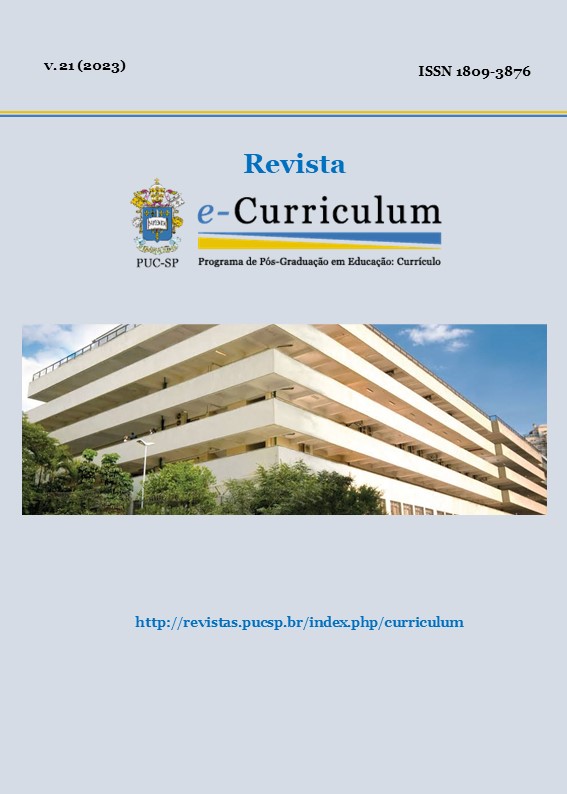Aspects of Andrew Feenberg’s thought in the light of phenomenology
DOI:
https://doi.org/10.23925/1809-3876.2023v21e51420Keywords:
Andrew Feenberg, Herbert Marcuse, Martin Heidegger, education and technologyAbstract
The present work aims to understand aspects of Feenberg’s thought in a context in which technologies are part of the formative and productive processes, in addition to delineating human existence. The research has a theoretical nature, with a qualitative approach and a phenomenological substantiation, based in the contributions of Bicudo (2011), whose theoretical framework runs through the works of Feenberg (2004; 2010; 2017), Heidegger (1959; 2002; 2007) and Marcuse (1973; 1999; 2001). In the face of the addressed references and although the philosophy of technology has come a long way since Heidegger and Marcuse, the results indicate that Feenberg elaborates his own theory, capable of responding to the specificities inserted in the historical situation in which people find themselves today.
References
Aristóteles. Metafísica. Ensaio introdutório, texto grego com tradução e comentário de Giovanni Reale. 3. ed. São Paulo: Edições Loyola, 2014.
Baudrillard, Jean. Simulacros e simulação. Lisboa: Relógio d’Água, 1991.
Baudrillard, Jean. A sociedade de consumo. 2. ed. Lisboa: Edições 70, 2010.
Bicudo, Maria Aparecida Viggiani. Estudos sobre existencialismo, fenomenologia e educação. São Paulo: Moraes, 1983.
Bicudo, Maria Aparecida Viggiani (Org.). Pesquisa qualitativa segundo a visão fenomenológica. São Paulo: Cortez, 2011.
Brüseke, Franz Josef. A crítica da técnica moderna. Estudos Sociedade e Agricultura, v. 10, p. 5-55, abr. 1998. Disponível em: http://bibliotecavirtual.clacso.org.ar/ar/libros/brasil/cpda/estudos/dez/brusek10.htm. Acesso em: 21 mar. 2020.
Feenberg, Andrew. Questioning Technology. 3. ed. London: Routledge, 1999.
Feenberg, Andrew. Transforming Technology: A Critical Theory revisited. New York: Oxford University Press, 2002.
Feenberg, Andrew. A teoria crítica da tecnologia: nota autobiográfica. Piracicaba: Unimep, 2004. Disponível em: https://www.sfu.ca/~andrewf/critport.pdf. Acesso em: 31 maio 2020.
Feenberg, Andrew. Heidegger and Marcuse: the catastrophe and redemption of history. London: Routledge, 2005.
Feenberg, Andrew. Between Reason and Experience: Essays in Technology and Modernity. Cambridge: The MIT Press, 2010.
Feenberg, Andrew. Tecnologia, modernidade e democracia. Lisboa: MIT Portugal, 2015. Disponível em: https://www.sfu.ca/~andrewf/TECNOLOGIA_MODERNIDADE_DEMOCRACIA.pdf. Acesso em: 8 set. 2020.
Feenberg, Andrew. Entre a razão e a experiência: ensaios sobre tecnologia e modernidade. [S. l.]: MIT Portugal, 2017.
Feenberg, Andrew. A polêmica Educação online e o futuro da universidade. [S. l.: s. n.], 2017. Disponível em: https://www.sfu.ca/~andrewf/a%20polemica.pdf. Acesso em: 2 jun. 2019.
Feenberg, Andrew. About Andrew Feenberg. Vancouver: Simon Fraser University, 2019. Disponível em: https://www.sfu.ca/~andrewf. Acesso em: 5 jun. 2020.
Freud, Sigmund. O ego e o id. Rio de Janeiro: Imago, 1975.
Freud, Sigmund. O mal-estar na civilização. Rio de Janeiro: Imago, 2002.
Heidegger, Martin. Serenidade. Lisboa: Instituto Piaget, 1959.
Heidegger, Martin. Ensaios e conferências. Petrópolis: Vozes, 2001.
Heidegger, Martin. Ser e tempo. Petrópolis: Vozes, 2002.
Heidegger, Martin. Aportes a la filosofía: acerca del evento. Buenos Aires, Biblioteca Internacional Heidegger, 2003.
Heidegger, Martin. A questão da técnica. Scientiae Studia, São Paulo, v. 5, n. 3, p. 375-398, set. 2007. Disponível em: http://www.revistas.usp.br/ss/article/view/11117/12885. Acesso em: 18 abr. 2020.
Marcuse, Herbert. The Obsolescente of Marxism. In: Lobhowicz, Nicholas. Marx and the Western World. Notre Dame: University of Notre Dame Press, 1967. p. 409-417.
Marcuse, Herbert. A ideologia da sociedade industrial: o Homem Unidimensional. 4. ed. Rio de Janeiro: Zahar, 1973.
Marcuse, Herbert. A ecologia é revolucionária. Oitenta, Porto Alegre, n. 8, p. 55-58, 1983.
Marcuse, Herbert. One-dimensional Man: Studies in the Ideology of Advanced Industrial Society. 2. ed. Boston: Beacon Press, 1991.
Marcuse, Herbert. De l’ontologie a la technologie. Les tendances de la societé industrielle. In: Raulet, Gérard. Herbert Marcuse: Philosophie de l’émancipation. Paris: PUF, 1992. p. 133-137.
Marcuse, Herbert. Cultura e sociedade. São Paulo: Paz e Terra, 1998.
Marcuse, Herbert. Algumas implicações sociais da tecnologia moderna. In: Marcuse, Herbert. Tecnologia, guerra e fascismo. San Pablo: UNESP, 1999. p. 71-104.
Marcuse, Herbert. The New Left and the 1960s: Collected Papers of Herbert Marcuse. v. 3. London: Routledge, 2004. Disponível em: https://pages.gseis.ucla.edu/faculty/kellner/essays/newleftand1960s.pdf. Acesso em: 5 set. 2020.
Mumford, Lewis. Technics and Civilization. Londres: Routledge, 1934.
Mumford, Lewis. Art and Technics. Nova Iorque: Columbia University Press, 1952.
Safranski, Rüdiger. Um mestre da Alemanha: Heidegger e o seu tempo. Lisboa: Instituto Piaget, 1994.
Safranski, Rüdiger. Demonização da técnica e técnica demonização. In: Safranski, Rüdiger. Heidegger: um mestre da Alemanha entre o bem e o mal. São Paulo: Geração Editorial, 2000. p. 455-472.
Weber, Max. A ética protestante e o espírito do capitalismo: texto integral. São Paulo: M. Claret, 2001.
Weber, Max. A gênese do capitalismo moderno. São Paulo: Ática, 2006.
Downloads
Published
How to Cite
Issue
Section
License
Copyright (c) 2023 Revista e-Curriculum

This work is licensed under a Creative Commons Attribution 4.0 International License.
Os autores concedem à revista todos os direitos autorais referentes aos trabalhos publicados. Os conceitos emitidos em artigos assinados são de absoluta e exclusiva responsabilidade de seus autores.Todo o conteúdo da Revista e-Curriculum é aberto para acesso público, propiciando maior visibilidade, alcance e disseminação dos trabalhos publicados.











